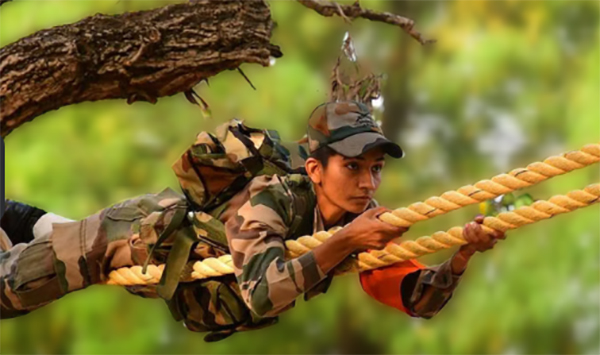
The court, on 3 March, said that although it has sympathy with the petitioner, who claimed that she was not selected even as some of the male candidates with lower marks got through, the court cannot issue any order on assigning a 50-50 quota for women candidates at NDA at this time.
The National Defence Academy (NDA), which was exclusively a man’s world, has finally been opened to women but it may not be feasible for the court to prescribe 50% reservation for female cadets in the elite institution, the Supreme Court held, on 3 March, as it turned down a plea by a former NDA aspirant.
Justice Sanjay Kishan Kaul noted that his bench was already monitoring the matter in a different batch of petitions where a bundle of larger issues was under consideration.
“Opening of seats for women candidates has to occur over a period of time. It’s not possible to have 50% seats for women at once. All the relevant issues are being looked into in the other matter to see how the best can be achieved for the women candidates,” the bench, which also included justice Aravind Kumar, said.
Each course at NDA has 370 vacancies for the three services. Of these, 208 cadets get commissioned to the Indian Army, 120 to the Indian Air Force, and 42 to the Indian Navy. Under the existing regime, the intake of women cadets in the Pune-based institution is limited to 19 per batch. The NDA exam is conducted twice a year, NDA-I in the first half of the year and NDA-II in the second.
The court said that although it has sympathy with the petitioner, who claimed that she was not selected even as some of the male candidates with lower marks got through, the court cannot issue any order on assigning a 50-50 quota for women candidates at NDA at this time.
“We cannot do it like this…how can we say given them 50% seats? It was a man’s world literally. From there, we have travelled to a position where infrastructure and facilities were created for women candidates too and some seats were created. There are several factors involved and we are looking at it in the other matter. One fine day, we cannot say, do it 50:50,” the bench told advocate Jyotika Kalra, who appeared for the petitioner aspirant.
It is also a policy issue, said the bench. “We are trying for the best outcome in the matter but we cannot say that they should now have candidates in a 50:50 ratio. Things have to happen gradually and within certain framework… Your objective may be noble but we cannot do it in this manner,” it added.
At this, Kalra requested the bench to allow her to assist the court in the main case in which the court, in August 2021, ordered that women can also sit for the NDA exam, and declared that the policy that restricts their entry into the elite institution is based on “gender discrimination”.
The lawyer pointed out that she could bring to the court certain issues that may require ironing out, adding one of her requests would be to direct publication of separate merit lists for men and women candidates. The court accepted Kalra’s request and allowed her to appear in the other case, filed by Kush Kalra through advocate Mohit Paul.
Breaking the glass ceiling after 65 years, the top court in August 2021 rejected the government’s argument that the restriction against women from training at NDA was a policy decision while issuing the interim order to let them sit for the exam in November.
It also implored the government to “take a more constructive view of the matter”, prompting the Union government to come back to the court in September 2021 with a policy decision to open the doors of NDA to women cadets as well.
Under the eligibility criteria at that point of time, only male candidates who cleared Class 12 or its equivalent and were in the age group of 16-and-a-half and 19 were eligible to apply.
Those who clear the NDA exam are called for interview by the Service Selection Board (SSB), and following a medical exam, candidates are recruited in the army, navy, and air force wings of NDA, and for the INA course for pre-commission training. NDA was commissioned in 1955.
In the exam conducted in November 2021, women candidates comprised 178,000 of the 570,000 applications, and 1,002 women cleared the written exam. The Union Public Service Commission (UPSC) came out with a press note in December 2021, declaring 19 women candidates as successful.
UPSC also issued a notice on December 22, 2021 for the NDA-I exam notifying the figures for induction to the armed forces. It mentioned a total of 208 candidates, including 10 women, for the army; 42, including three women for the navy; and 120 candidates, including six women, for the air force. According to this notice, all 30 seats in the Naval Academy were to be filled up by male cadets.
In an affidavit filed in March 2022, the Union government justified restricting the intake of women cadets at NDA to 19 per batch for the time being, claiming the number is based on sound rationale and current requirement of the armed forces.
The headcount of women in the military has increased almost threefold over the last six years, with more avenues being opened to them at a steady pace. As of February 2021, 9, 118 women were serving in the armed forces.
The Supreme Court, in February 2020, ruled that SSC women officers were entitled to permanent commission (PC) in the army and navy and that they have to be considered irrespective of their service length. This judgment led to around 5,020 women officers being granted PC.

















